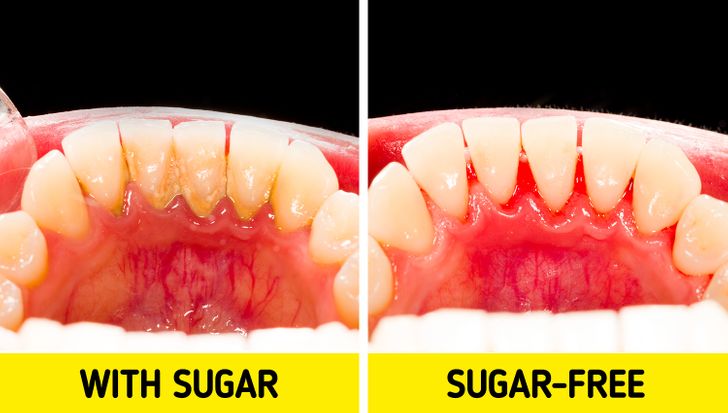Chewing gum has been around for thousands of years, with ancient civilizations using everything from birch bark tar to modern chewing gum. While we typically think of it as a way to freshen our breath or pass the time, there’s more to chewing gum than meets the eye. Surprisingly, chewing gum has a variety of effects on your body, and not all of them are as beneficial as you might think.
In this post, we’ll explore the health benefits of chewing gum as well as the risks it can pose, so you can make an informed decision about this seemingly harmless habit.
Chewing Gum Effects On The Body
6. How Chewing Gum Affects Your Teeth

Good: When you chew sugar-free gum, it can be surprisingly good for your oral health. Studies show that sugar-free gum can help kill bacteria, prevent cavities, and even fight gingivitis. The chewing action stimulates saliva production, which helps wash away food particles, neutralize acids, and provide calcium and phosphate that strengthen your enamel.
Bad: However, if you’re chewing gum with sugar, you could be doing your teeth a disservice. Sugar feeds the bacteria in your mouth, leading to plaque buildup and an increased risk of tooth decay.
Tip: For optimal oral health, choose sugar-free gum with xylitol, which has been shown to reduce cavity-causing bacteria.
Boosts Memory and Mental Clarity
Chewing gum may help enhance brain function in the short term. Research suggests that the act of chewing increases blood flow to the brain, which can improve focus, alertness, and memory. This makes it a great option before or during mentally demanding tasks.
However, its effects are temporary, and once the task is over, the benefits dissipate. Chewing gum for focus is helpful, but don’t rely on it long-term for cognitive enhancement.
Tip: Pair gum chewing with brain-boosting foods like nuts and berries for better long-term cognitive health.
Aids in Weight Loss?

Good: Surprisingly, chewing gum can help with appetite control. Many people find that chewing gum in the morning reduces their hunger pangs and helps them resist unhealthy snacks throughout the day. Gum can also boost metabolism and increase energy expenditure, helping you feel less tired after meals.
Bad: While gum may help curb your appetite, it can also have the opposite effect. Constant chewing can trick your brain into thinking you’re still hungry, and gum with minty flavors can even increase cravings for junk food, making it harder to stick to healthier options.
Tip: If you’re using gum to control your appetite, choose sugar-free gum and pair it with healthy meals and snacks to maintain energy without indulging in empty calories.
Jaw and TMJ Issues: The Hidden Risk

Bad: Long-term gum chewing can lead to jaw pain and temporomandibular joint (TMJ) disorder. The constant chewing motion can strain the muscles and joints in your jaw, causing pain that can radiate to your neck and shoulders. This is particularly common when you chew gum during times of stress or anxiety.
Tip: If you’re prone to jaw pain, consider switching to gum-free stress-relief activities like meditation or deep breathing exercises.
The Digestive System: A Double-Edged Sword

Good: Did you know that chewing gum can help with morning motion sickness? Increased saliva production can ease nausea and help with digestive discomfort. Some studies even suggest that it works better than medication in some cases.
Bad: However, for those with sensitive stomachs, gum chewing may lead to digestive problems. Swallowed air from chewing can cause bloating, and the sugar alcohols used as sweeteners may lead to cramps or diarrhea.
Tip: If you suffer from digestive issues, choose gum with natural sweeteners like stevia to avoid the harsh effects of sugar alcohols..
Stress Relief and Mood Improvement

Good: One of the most surprising benefits of chewing gum is its ability to reduce stress. Studies show that chewing gum can lower levels of cortisol, the stress hormone, and improve mood. It’s a simple, easy way to lift your spirits and reduce anxiety during a stressful day.
Bad: However, frequent chewing can increase the occurrence of headaches and migraines, especially for those prone to tension headaches. If you’re already susceptible to migraines, it’s best to avoid excessive gum chewing.
Tip: For a stress-free day, combine gum chewing with other relaxation techniques like yoga or deep breathing.
Conclusion: The Pros and Cons of Chewing Gum
Chewing gum can have some surprising benefits, from improving memory and focus to aiding in weight loss and relieving stress. However, it’s important to be aware of the potential downsides, especially regarding your teeth, jaw health, and digestive system.
To get the most out of chewing gum, opt for sugar-free gum with natural sweeteners and chew it in moderation. Combine it with other healthy habits like a balanced diet and regular exercise for maximum benefits.
Do you like to chew gum? Have you noticed any changes in your body with this?









Leave a Reply